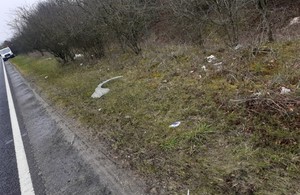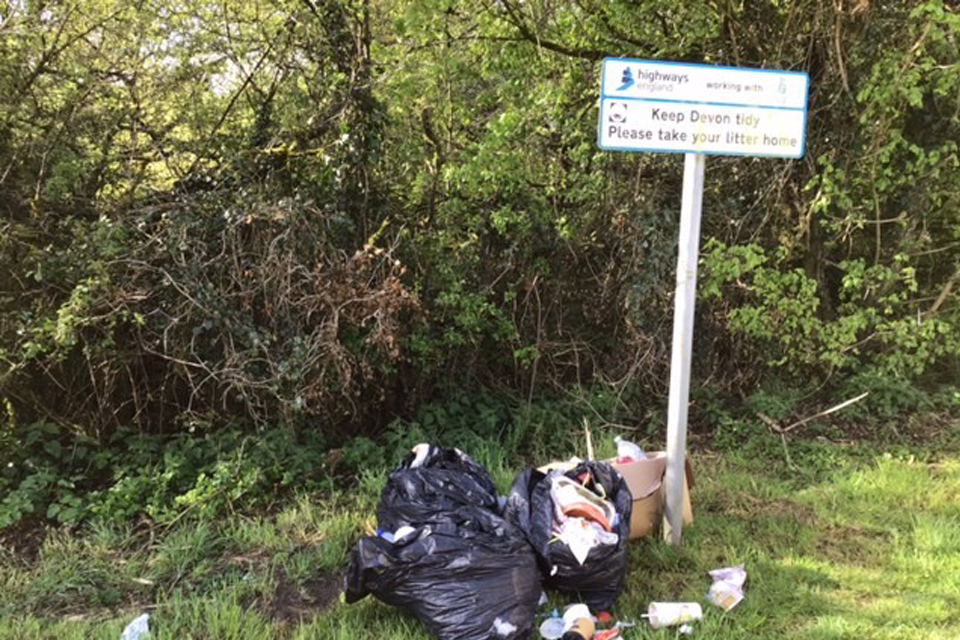Drop in for a visit, but don’t drop your litter
As drivers take to the South West for their domestic holidays, Highways England is issuing advice to keep the region’s roadsides clear of litter.

Litter strewn alongside the verges of the A303 in Wiltshire
Litter on the majority of A roads in the region is the responsibility of local authorities to clear, but in order that it can be collected safely Highways England often teams up with councils to co-ordinate any necessary closures.
Reducing the amount of roadside litter not only improves the lives of both communities and motorists, but also provides a significant saving to local authorities in terms of time and money spent on clearing rubbish from the roadsides.
Now Highways England is calling on drivers to do their bit to reduce litter levels following the completion of a big regional effort during the Great British Spring Clean (28 May-13 June).
Chris Regan, South West Head of Service Delivery for Highways England, said:
Littering is a social problem across the country and our priority, working closely with our partners, is to keep our roads safe and well maintained for drivers and neighbouring communities.
Roadside litter is not just unsightly but it’s a threat to wildlife and the environment and it can also be a safety hazard for drivers, can block drains and picking it up puts roadworkers at risk.
Litter collections on our A roads are the responsibility of local authorities and hopefully we can get the message across that litter not only impacts people’s lives but also has a significant economic impact for our councils across the region.
At the onset of the pandemic last year, Highways England funded and delivered a scheme to install bins and signage in a number of laybys on routes across the South West, but local authorities, including smaller funded district and city councils, are still reporting a staggering amount of litter being cleared around their roads.
This year alone on the road network:
- Wiltshire Council has collected 2,215 bags of litter and 22 vehicle tyres (around 29 tonnes of rubbish), including 981 bags from the A36 and A303
- An estimated 20 tonnes of litter, tyres, car bumpers and signage were swept and removed from Cornwall’s trunk roads in a six-week clean-up that started in mid-April.
- Devon authorities spend around £7 million annually keeping the county clean, and the Clean Devon Partnership is working with business and residents to tackle this anti-social habit
- Dorset Council has embraced the Great British Spring Clean with a Litter Free Dorset campaign, including Love Your Verge and Roadside Litter initiatives
- Plymouth City Council has collected over 6 tonnes of waste from verges along the A38 and slip roads – a stretch of just eight miles
- Gloucester City Council picked up just over a tonne of litter from the A40 this spring

Litter left in an A30 layby near Okehampton, at the foot of a Highways England ‘Keep Devon tidy’ sign
Highways England, via its contractors, collected 800 bags of litter from the verges of the A30 and A35 in East Devon and Dorset during the Great British Spring Clean.
And over the last month, Highways England has also swept up sackfuls of litter from its motorways in the South West - 300 bags along the M4 and 200 bags from the M5.
Mr Regan added:
As pandemic restrictions are eased, we appreciate a lot of people will be heading to our beautiful part of the world – and our advice to drivers is clear: don’t drop litter. Please use any bins provided in laybys, heed the signage, and keep a bag in your car to store litter until you can dispose of it responsibly.
Sam Fox, Wiltshire Council’s Corporate Director, Place, said:
Our teams have been doing a fantastic job collecting litter on the Wiltshire highways network over the past 12 weeks, but it’s shameful that they have had to collect 2,215 bags and counting.
Much of this litter will have been thrown from moving vehicles, so we’d ask all motorists to please take their litter home and put it in their household bin - not throw it into the countryside, where it can harm the environment and wildlife, and also look unsightly.
We spend more than £2.5m each year picking up litter in Wiltshire. This could have been spent on other projects such as environmental initiatives and improvements to our public rights of way.
And Carol Mould, portfolio holder for Neighbourhoods at Cornwall Council, said:
Cornwall is a beautiful county and we want to keep it that way. There is no excuse for throwing litter on the side of the road, not only does it cost a lot of money to clean up, it can also pose a danger to other road users and can harm wildlife.
Please dispose of your rubbish responsibly and help keep Cornwall clean.
Cllr Lyn Daniel, West Devon Borough Council’s Lead Member for Natural Environment said:
Litter dumped at the side of the road or thrown from cars along the A30 spoils our beautiful countryside and clearing it up is an expensive and potentially dangerous process for our team. Please, if you’re driving to or through West Devon, don’t litter.
Councillor Maddi Bridgeman, Plymouth City Council’s Cabinet Member for Environment and Street Scene, added:
A really disappointing amount of rubbish finds its way onto verges along the A38 and there’s no doubt that much of this is thrown from vehicle windows.
Clearing rubbish from such a busy road is a challenging task and every time our crews have to go out, staff and money are diverted from other cleansing works.
It’s a crime to dump rubbish, wherever you are. We urge motorists to store their rubbish securely until they get home and ask that anyone witnessing littering reports it to us, with dash-cam footage if they have it, so that we can investigate.
General enquiries
Members of the public should contact the Highways England customer contact centre on 0300 123 5000.
Media enquiries
Journalists should contact the Highways England press office on 0844 693 1448 and use the menu to speak to the most appropriate press officer.